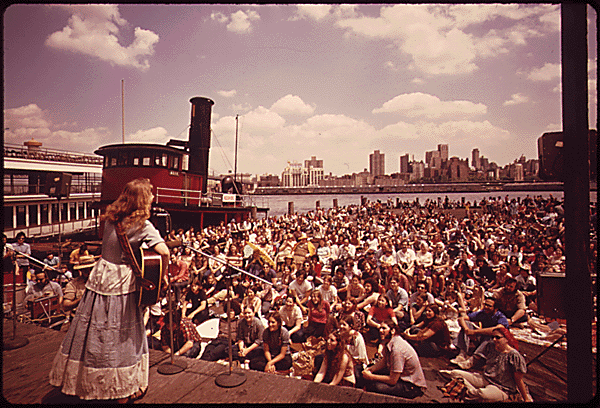Lessons learned from twentieth century pop songs
It’s okay if we don’t remember everything. (U.S. National Archives)
On Friday afternoons, there's a great little show on Maine Public Radio called Down Memory Lane, hosted by Bangor's Toby Leboutillier (like many Mainahs, he pronounces all the consonants in his Francophonic name).
The show aired on Maine's NPR affiliate stations for decades and now is found only online, and only in realtime. You can find the show by going to mainepublic.org between the hours of 2:00 and 5:00 PM Eastern on Fridays, clicking on the down arrow at the top, and then clicking on "Down Memory Lane." What this looks like on a desktop computer is shown below:
My dad has been listening to this show every week since 1979, when he came across it while putting the skim coat on the walls of a third-floor bedroom in our old house in York Harbor, Maine. (No Spotify back then.) He became such a fan, in fact, that my mom even arranged for him to spend an afternoon with Toby a few years ago as a special birthday gift. On Fridays around 1:55, Dad gets a wild look in his eye and shouts, "Toby!" as he frantically looks for his phone in order to listen from minute one.
The show explores music from the 1910s through the 1960s, week by week. For example, this week, it consists of songs from mid-December 1919, 1929, 1939, 1949, 1959, and 1969. Toby also reads excerpts from the Bangor Daily News for the same time periods.
The genius of the show is not is not that Toby plays the hits. Instead, he plays songs that entered the hit parade or the Billboard Top 100 during that week in history. Occasionally, you'll hear a song that became a hit, but mostly, these are songs that charted but failed to become major hits (simply because most songs don't become major hits).
This is fascinating for two reasons. First, the hits really stand out. Once, "The Night Time is the Right Time" by Ray Charles came on. After hearing a bunch of forgettable songs from the same time period, it was easy to see why this one was such a classic. It's not only a hit, it has stood the test of time. Another time, it was “Hey Jude.” Hard to argue with that.
The flip side of this is that the non-hit or minor-hit songs function as tiny time capsules. They are awkward, schmaltzy, trying too hard, faddish, or dated. For someone who wasn't alive during the time period in question, these songs make it easier to imagine what mundane daily life was really like back then.
For anyone who has ever said, "The music kids listen to these days in crap" (which is almost everyone over the age of twenty-two), these minor hits that Toby plays give some useful perspective. It's not that today's music is terrible: It's just that we don't have the benefit of a few decades of distance to tell which songs are the gems which will stand the test of time.
For those of us who work with kids, it’s helpful to remember that pop culture is fresh for them. The new and now is all they have, and it belongs to those who are listening to the radio and watching YouTube for the first time in their lives. Even though most of this music and memes will not be remembered thirty years from now, some of it will. It’s no more or less valid than whatever the baby boomers, gen Xers, or millennials were into. Though the individual artists may not all deserve our respect, young teenagers and their choices do.
There is also a metaphorical resonance here. It’s all too easy to get wrapped up in the day-to-day, believing that everything we’re doing is equally important and relevant to our future. We may feel a responsibility to keep up with the day’s news, follow on every social obligation, and respond to every email.
Toby’s show reminds us that not most if what’s happening now will matter in ten, twenty, or sixty years. In February 1961, Del Shannon’s timeless “Runaway” entered the hit parade; it was joined by “Ling Ting Tong” by Buddy Knox, which is an awful remake of a song which was highly questionable in the first place. Decades later, it’s clear that not everything is worth remembering.
Can we tell, now, what to prioritize? Not always. Every so often, there’s a moment or a song that you know will stay with you for rest of your life; most of it won’t. With this perspective, what might we change or adjust in order to improve the quality of our days?

